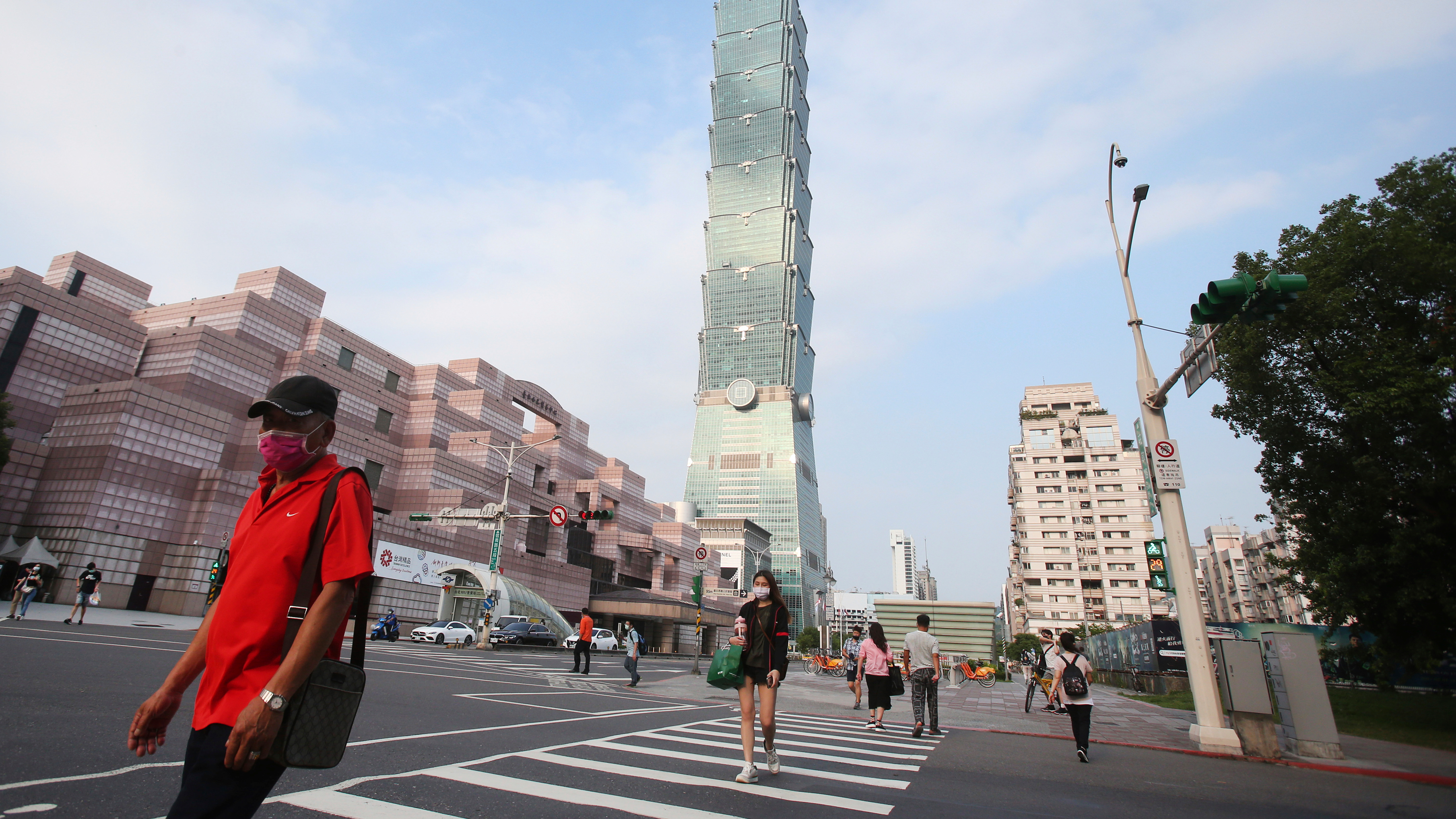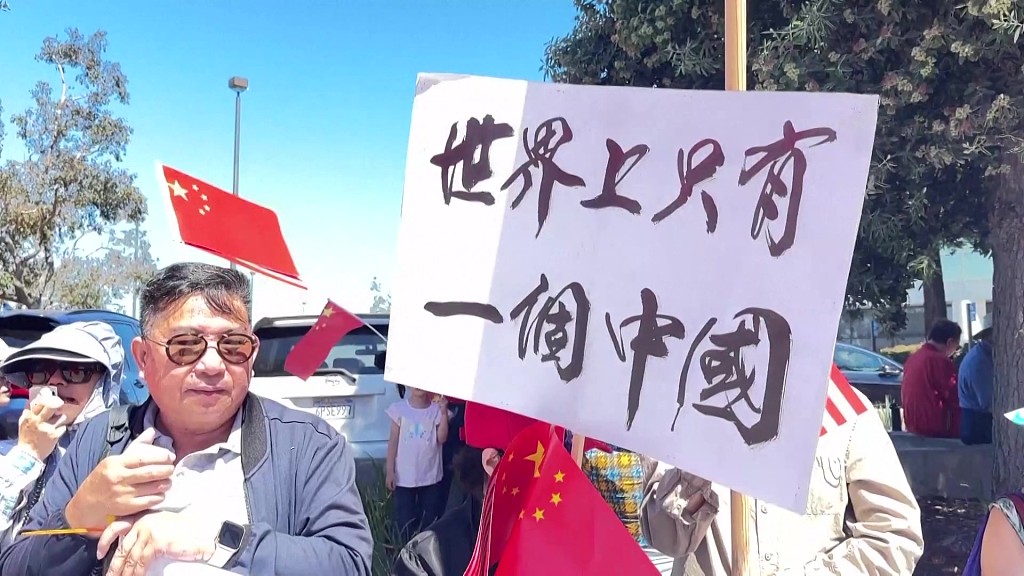
People walk past Taipei 101 building in Taipei, Taiwan, China, May 15, 2021. /CFP
People walk past Taipei 101 building in Taipei, Taiwan, China, May 15, 2021. /CFP
Editor's note: Danny Haiphong, a special commentator for CGTN, is an independent journalist and researcher in the United States. He is a contributing editor to the Black Agenda Report, co-editor of Friends of Socialist China, and founding member of the No Cold War international campaign. The article reflects the author's opinions and not necessarily the views of CGTN.
Taiwan's authority won't hold its leader election until January 2024 yet the Democratic Progressive Party (DPP) candidate Lai Ching-te is already provoking China by pushing separatism. Despite China's strong diplomatic and military response to Nancy Pelosi and Kevin McCarthy's provocative visits to Taiwan last year, Lai stopped over in New York City and San Francisco on his way to Paraguay on August 12-18. China rebuked Lai's visit and vowed forceful measures to safeguard China's territorial integrity and sovereignty.
It should come as no surprise that the DPP is crossing China's redline of separatism. The current leadership under Tsai Ing-wen has tailored its policy agenda around attacking China. U.S. military aid has continued to flow to Taiwan, including $345 million worth of weapons earmarked under U.S. President Joe Biden's Presidential Drawdown Authority. This is the same authority that the U.S. has employed in its active participation in the Ukraine conflict. Furthermore, the DPP has coordinated closely with the U.S. to arrange "official" visits in violation of the one-China principle.
The dead-end cause of separatism pushed by the U.S. is supported by a narrative of lies and historical distortions. In an interview with Bloomberg published on August 15, Lai Ching-te promoted these lies ad nauseam. Lai claimed that Taiwan must defend itself from China's attempts to "annex" Taiwan. Not only has China patiently championed a measured approach to reunification, but the word "annex" also indicates that Taiwan is a separate country apart from China. In the interview, Lai refers to Taiwan as an "independent country" several times.
This historical inaccuracy demonstrates the fallacies inherent to the dead-end campaign of Taiwan separatism. When Lai says that "Taiwan is already a sovereign, independent country called the Republic of China," as he did in the interview, he is expressing an opinion without any connection to historical fact. For one, the Republic of China represents the former political leadership of all of China which lost power to the People's Republic of China, or New China, in 1949. In 1971, the UN passed Resolution 2758, which stipulated that the People's Republic of China is "the only legitimate representative of China to the United Nations."

People hold their banner saying "there is only one China in the world" to protest against Lai Ching-te's "transit" visit to San Francisco, U.S., August 16, 2023. /CFP
People hold their banner saying "there is only one China in the world" to protest against Lai Ching-te's "transit" visit to San Francisco, U.S., August 16, 2023. /CFP
Furthermore, the biggest champion of "Taiwan independence," the U.S., is a signatory of three joint communique recognizing Taiwan as part of China's sovereign territory. Still, this hasn't stopped the U.S. from contradicting its diplomatic commitments.
Such hypocrisy is also rooted in history. In conjunction with the U.S.-China joint communique, the U.S. passed the Taiwan Relations Act in 1979, which placed the U.S. on two different diplomatic roads concerning Taiwan; one claimed respect for the one-China principle and another undermined it with continuous arms sales and "de facto" diplomatic relations with separatist forces.
That the DPP ignores this basic history in favor of pursuing the U.S.'s dangerous Cold War agenda comes with great risk. Lai's visit to the U.S. is a political ploy that trades in global stability for the possibility of short-term political success.
Drumming up "Taiwan independence" as a primary political issue may very well backfire. While early election polls show Lai in the lead in the 2024 election, other survey data sheds light on growing public dissatisfaction with the DPP. According to the Taiwan Public Opinion Foundation, 48.2 percent of Taiwan's residents disagree with the leadership of the DPP's Tsai Ing-wen currently governing the island.
Lai Ching-te is not just pushing lies that negate history and current political trends. U.S. officials have long admitted to plans of seeking to turn Taiwan into a militarized "porcupine" from which to provoke China. Lai has thus placed regional peace and stability at risk by following U.S. orders via the dead-end of separatism. So-called official visits between the U.S. and DPP's pro-independence forces, ongoing U.S. arms to the island, and a host of other provocations are escalating the threat of war, not China.
China has repeatedly verbalized its commitment to peaceful reunification and backed up its statements with action. Lai Ching-te is thus carrying a torch with the fire lit by the United States. The saying goes that playing with fire eventually leads to burns. Until the U.S. learns to follow the one-China principle in full, "Taiwan independence" forces such as Lai will continue to feel emboldened to provoke hostility regardless of the cost. And China won't stand by and allow its sovereignty to be violated.
(If you want to contribute and have specific expertise, please contact us at opinions@cgtn.com. Follow @thouse_opinions on Twitter to discover the latest commentaries in the CGTN Opinion Section.)